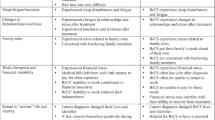Abstract
This study examined African-American cancer patients’ attitudes toward cancer and their relationship with long-term mental health outcomes. Using mixed methods, 74 breast and prostate cancer patients including 34 depressed and 23 nondepressed African-Americans and 17 depressed Whites were interviewed. The interviews were audiotaped and transcribed. Qualitative data analysis identified themes that were coded. The codes were entered into SPSS software. Fisher’s exact test was performed to examine group differences in the identified themes. Nondepressed African-Americans more frequently reported cancer as an adaptive experience (p = 0.047) and less frequently as a struggle (p = 0.012) than the depressed African-Americans and Whites. Groups did not significantly differ in the belief that cancer has no cure (p = 0.763), but depressed African-Americans more frequently reported unwillingness to share a cancer diagnosis with family or friends than depressed Whites (p = 0.50). African-Americans’ adaptive attitudes to cancer exhibit a pragmatist approach and a worldview shaped by their lived experience. Participants’ narratives were examined to illuminate the meanings of these findings. Adaptive attitudes to cancer are associated with better long-term mental health outcomes, and conversely, unpreparedness and inability to cope are associated with a higher risk of depression among African-American cancer patients. Education about cancer and supports for treatment navigation are important measures for improving the long-term mental health of African-Americans living with cancer.
Similar content being viewed by others
References
ACS (2012) Cancer facts and figures for African Americans 2011–2012. American Cancer Society, Inc., Atlanta
Baker FM (2001) Diagnosing depression in African Americans. Community Ment Health J 37(1):31–38
Neighbors HW, Njai R, Jackson JS (2007) Race, ethnicity, John Henryism, and depressive symptoms: the national survey of American life adult reinterview. Res Hum Dev 4(1&2):71–87
Amankwaa LC (2003) Postpartum depression among African-American women. Issues in Mental Health Nurs 24(3):297–316
Zhang AY, Gary F, Zhu H (2013) Initial evidence of religious practice and belief in depressed African American cancer patients. Open Nursing J 7:1–5. doi:10.2174/1874434601307010001
Mansfield CJ, Mitchell J, King DE (2002) The doctor as God’s mechanic? Beliefs in the Southeastern United States. Soc Sci Med 54(3):399–409
Morgan PD, Tyler ID, Fogel J (2008) Fatalism revisited. Semin Oncol Nurs 24(4):237–245
Peek ME, Sayad JV, Markwardt R. Fear, fatalism and breast cancer screening in low-income African-American women: the role of clinicians and the health care system. Journal of General Internal Medicine 23(11):1847–53.
Shankar S, Selvin E, Alberg AJ (2002) Perceptions of cancer in an African-American community: a focus group report. Ethn Dis 12(2):276–283
Amankwaa LC Postpartum depression, culture and African-American women. J Cult Divers 10(1):23–29
Gary FA (2005) Stigma: barrier to mental health care among ethnic minorities. Issues Mental Health Nursing 26(10):979–999
Sue S (1998) In search of cultural competence in psychotherapy and counseling. Am Psychol 53(4):440–448
Muhr T, Friese S (2004) User’s Manual for ATLAS.ti 5.0. Scientific Software Development, Berlin
Hamilton JB, Moore CE, Powe BD, Agarwal M, Martin P (2010) Perceptions of support among older African American cancer survivors. Oncol Nurs Forum 37(4):484–493
Zhang AY, Siminoff LA (2003) Silence and cancer: why do families and patients fail to communicate? Health Commun 15(4):415–429
Acknowledgements
This study was supported by the National Institutes of Health/National Cancer Institute (R03 CA115191-01A2; PI: Zhang). University Hospitals of Cleveland Case Medical Center, the Cleveland Department of Veterans Affairs Medical Center, and the MetroHealth System affiliated with Case Western Reserve University provided support for patient access. The authors declare that they have no conflicts of interest.
Author information
Authors and Affiliations
Corresponding author
Rights and permissions
About this article
Cite this article
Zhang, A.Y., Gary, F. & Zhu, H. Attitudes Toward Cancer and Implications for Mental Health Outcome in African-American Cancer Patients. J Canc Educ 30, 138–144 (2015). https://doi.org/10.1007/s13187-014-0704-0
Published:
Issue Date:
DOI: https://doi.org/10.1007/s13187-014-0704-0



